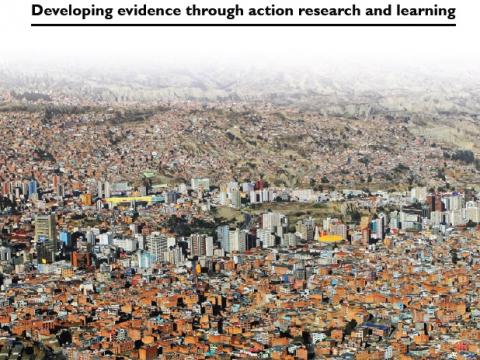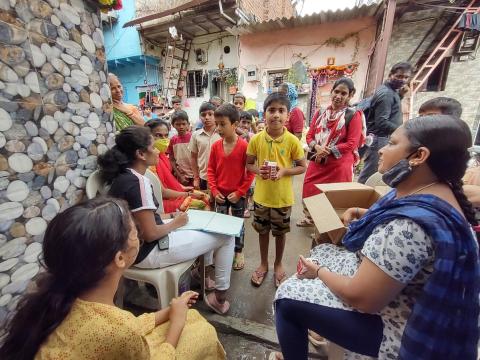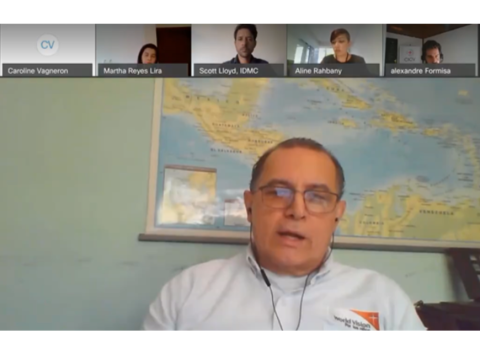
Urban Work
Our Impact
59
17%
17,205,596
Just cities for all children
The world is increasingly urbanising; but not in an equitable fashion. Globally, more than 1 billion people live in urban slums; 350 to 500 million among them are children. In those settings, children are exposed to multiple risks impacting their wellbeing such as living in unsanitary and crowded conditions, lack of access to potable water or nutritious food as well as other social risks.
At the same time, increasing climate risks, violence and conflicts in urban areas are impacting children living in urban environments beyond slums and informal settlements.
World Vision is responding to the increasing exposure to vulnerability among children across the humanitarian-development peacebuilding nexus with urban programmes in 47 countries. Our urban programming is multi-tiered: while we are present at the most grassroots level, in urban neighbourhoods, slums and informal settlements responding to the direct needs of urban residents, we also engage with local and citywide stakeholders, including municipalities, the private sector, academia and other civil society organisations for maximising impact.
In order to sustain the outcomes of our work, we engage urban residents in transforming policies at the city and national level, and influencing city planning, budgeting and programmes to respond to the needs and rights of the most marginalised urban populations.
Our Approaches
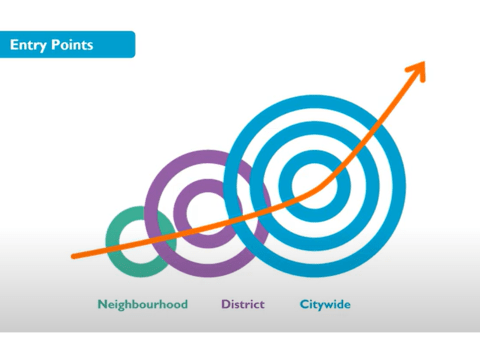
Citywide self-sustaining model
The 'Citywide Self-Sustaining Model' is an integrated approach to urban programming. It aims to generate sustainable social impact in cities, focusing on inclusion of the most vulnerable, especially children.
The model emphasises scaling with and through partners, building coalitions for effective action, and influencing policy development and implementation.
The intended outcomes of the model include:
- Identification and inclusion of the most vulnerable children and groups.
- Build coalitions and partnerships for citywide scale, effectiveness and impact.
- Contribution to global and national discourse and dialogue that shape urban policy.
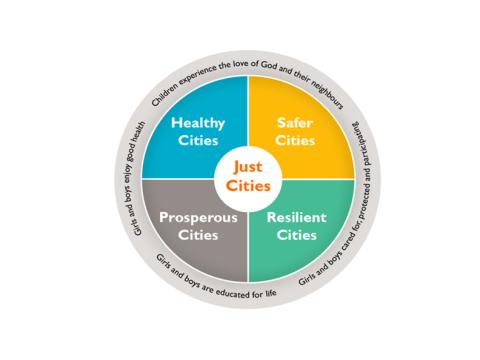
Cities for children framework
Promoting just and inclusive cities where children thrive in safe, healthy, resilient, and prosperous environments.
'Cities for Children' is World Vision's framework for addressing children's vulnerabilities in urban contexts.
The Framework consists of four inter-related domains of change affecting child wellbeing in cities: health, safety, resilience and prosperity. Underpinning these domains is the enabling factor of advocacy to seek justice and inclusion of the most vulnerable through policy change.
The Framework also identifies critical strategic pillars and enablers of change common to all domains that are essential for sustainable development in urban settings.
Our Work in Urban
Related Videos
Frequently Asked Questions
What are urban slums?
Urban slums are densely populated areas within cities where people live in inadequate housing conditions, often without access to basic services such as clean water, sanitation, safe shelter, and secure tenure. These areas typically develop informally and are not officially recognised by authorities, which leaves residents at risk of eviction and exclusion from urban planning and public services. Slums are often marked by poverty, overcrowding, and limited livelihood opportunities, making them a priority for inclusive and sustainable urban development efforts.
Source: UN-Habitat
What causes the formation of urban slums?
Urban slums form due to a mix of factors, including rapid urban growth, a shortage of affordable housing, weak urban planning, and poverty. When cities grow faster than local governments can provide land, infrastructure, and services, low-income families often have no choice but to settle in informal areas. Forced displacement, unregulated migration, rural-to-urban migration, and limited access to formal jobs or credit also push people into urban slums. Many cities operate along a formal–informal continuum, where informal housing and services emerge to fill gaps left by formal systems. Slums often represent people’s efforts to self-organise and meet their basic needs in the absence of inclusive urban policies and planning.
Sources: UN-Habitat, World Cities Reports
How can urban slums be improved?
Urban slums can be improved through inclusive upgrading processes that prioritise the voices, needs, and rights of the communities themselves. This means working in partnership with residents to improve housing, access to water, sanitation, safe public spaces, and other essential services—without forced evictions. Slum upgrading is most effective when it builds bridges between informal communities and formal city systems, helping residents gain recognition, secure land tenure, and access city services and infrastructure. According to UN-Habitat, effective upgrading must go beyond project-based interventions to adopt a citywide approach—linking local action to policy change, scaling efforts across all informal settlements, and aligning with long-term urban development goals. A range of strategies can be used, such as in-situ upgrading, relocation, when necessary, street-led planning, provision of affordable housing, and strengthening legal and institutional frameworks to support long-term transformation.
Sources: World Bank, UN-Habitat
What defines an urban environment?
An urban environment is defined by a high concentration of people, infrastructure, and built-up spaces such as housing, roads, markets, and public services. It is typically shaped by formal and informal systems of governance, economy, and social life. Urban areas are diverse and dynamic, often marked by both opportunity and inequality. What makes an urban environment is not just its size or population, but the complexity of services, institutions, and interactions that distinguish it from rural settings.
Sources: World Vision, UN-Habitat
What challenges do urban environments face?
Urban environments face a range of interconnected challenges, especially in low- and middle-income countries where rapid growth often outpaces planning and service delivery. Many residents live in overcrowded, informal settlements without access to clean water, sanitation, or secure housing. Cities also struggle with environmental risks such as pollution, heat, and flooding, which are made worse by climate change and disproportionately affect children and vulnerable groups. Urban poverty, food insecurity, and lack of safe spaces for play and learning further compound social and health risks. Governance gaps and limited participation in local decision-making also hinder inclusive and responsive urban development.
Sources: Cities4children
How can urban environments be made more sustainable?
Urban environments can be made more sustainable by improving access to basic services, promoting affordable and safe housing, protecting green spaces, and investing in resilient infrastructure that supports both people and the planet. This requires inclusive planning that involves communities, especially those living in informal settlements, in shaping their cities. Sustainable cities reduce pollution, use resources efficiently, support local livelihoods, and strengthen systems that protect children and vulnerable groups from shocks such as climate change or conflict. Partnerships across governments, civil society, and the private sector are key to making long-term change possible.
Sources: World Cities Reports, World Vision
What are climate risks?
Climate risks are the potential negative consequences that arise when climate-related hazards—such as floods, heatwaves, droughts, or rising sea levels—interact with people, ecosystems, and infrastructure that are exposed and vulnerable. According to the Intergovernmental Panel on Climate Change (IPCC), these risks result from a combination of three factors: the severity and frequency of climate hazards, the degree to which people and places are exposed to them, and how vulnerable they are due to poverty, inequality, or limited adaptive capacity. Addressing climate risks means reducing emissions and strengthening systems so communities—especially the most vulnerable—can better prepare, respond, and adapt. In urban contexts, climate risks are amplified by dense populations, aging infrastructure, and unequal access to services—putting the urban poor, especially those in informal settlements, at highest risk of harm. Addressing these risks means reducing emissions and strengthening systems so communities—especially the most vulnerable—can better prepare, respond, and adapt.
Source: IPCC
How can climate risks be managed?
Climate risks can be managed by reducing the drivers of climate change while also helping people, systems, and cities adapt to its impacts. This involves both mitigation—such as cutting greenhouse gas emissions and promoting clean energy—and adaptation—like improving early warning systems, strengthening infrastructure, and protecting natural ecosystems. Managing these risks also means addressing the underlying vulnerabilities that make people more exposed, including poverty, poor planning, and lack of access to basic services. Inclusive, locally led solutions combined with long-term investment and global cooperation are essential to reduce harm and build resilience. In urban contexts, climate risks can be managed by investing in resilient infrastructure, upgrading informal settlements, and supporting community-led disaster risk reduction and anticipatory action—ensuring that residents are equipped to prepare for, respond to, and reduce the impact of climate shocks before they happen.
What are the financial implications of climate risks?
Climate risks have serious financial implications for individuals, communities, businesses, and governments. They can lead to rising costs from damaged infrastructure, disrupted services, lost livelihoods, and increased spending on disaster response and recovery. For the poorest, even minor climate shocks can push households deeper into poverty. At the national level, climate risks can slow economic growth, strain public budgets, and deter investment—particularly in vulnerable urban and fragile settings. Early investment in climate adaptation and mitigation is more cost-effective than managing the long-term consequences of inaction. In urban slums, for example, a flash flood can destroy homes, wash away informal businesses, or contaminate water sources—forcing families to divert scarce income to recovery instead of essentials like food, education, or healthcare. Cities, especially in low-income countries, face mounting costs in emergency response and rebuilding when climate risks go unaddressed.
Source: UNEP, IMF, World Bank
Who are urban residents?
Urban residents are people who live in towns or cities, including those in formal neighbourhoods, informal settlements, high-rise apartments, and street-based settings. They come from diverse backgrounds and include workers, families, migrants, youth, people with disabilities, and the elderly—each experiencing the city in different ways. Some may have secure housing and access to services, while others live in overcrowded or underserved areas without basic rights or protections. Recognising this diversity is essential to designing inclusive urban policies that respond to the needs of all city dwellers.
Sources: World Cities Reports, World Vision
What are the common issues faced by urban residents?
Urban residents often face a range of interconnected challenges, particularly in rapidly growing or under-resourced cities. These include inadequate access to affordable housing, clean water, sanitation, and reliable energy, which contribute to overcrowded living conditions and heightened health risks. Many urban areas also grapple with environmental hazards such as air pollution and the urban heat island effect, which disproportionately affect low-income communities. Limited access to public transport and green spaces, combined with exposure to crime and social inequalities, further exacerbate daily hardships. Addressing these issues requires inclusive urban planning and investment in resilient infrastructure. At the same time, migrants, displaced people, informal workers, and other non-citizens are often excluded from decision-making, lack voting rights, and are frequently left out of official data—making them invisible in policies and budgets. This exclusion reinforces inequality and weakens cities’ ability to respond fairly and effectively to the needs of all residents.
Sources: UN-Habitat, World Vision
How can the quality of life for urban residents be improved?
Improving quality of life in urban areas means creating inclusive, livable cities where all residents—regardless of income, background (race, ethnicity), legal status—have access to safe housing, reliable services, decent jobs, and a healthy environment. This includes investing in well-planned infrastructure, accessible public transport, resilient buildings, and digital connectivity. Strengthening local governance, reducing inequality, and promoting community participation are also key. When cities are planned and managed well, they can reduce poverty, promote opportunity, and improve well-being for millions of people, especially in fast-growing urban areas.
Sources: UN-Habitat, World Bank
What are peri-urban areas?
Peri-urban areas are the transitional zones between cities and the surrounding rural regions, where urban expansion meets farmland and open space. These areas often develop rapidly and informally, with mixed land use, unregulated construction, and limited access to services like water, sanitation, and transport. They are marked by blurred administrative boundaries, overlapping authorities, and high levels of social and environmental vulnerability. Because they are often overlooked in planning processes, peri-urban areas face significant challenges but also hold opportunities for more inclusive and sustainable urban growth.
Source: World Vision
What challenges do peri-urban areas face?
Peri-urban areas face a range of challenges linked to their rapid and often unplanned growth. These include poor access to basic services such as water, sanitation, transport, and education, as well as insecure land tenure and weak infrastructure. Because these areas fall between urban and rural jurisdictions, they often suffer from fragmented governance, limited investment, and lack of clear planning frameworks. Environmental degradation, social exclusion, and vulnerability to climate risks are also common, especially where informal settlements dominate. These challenges make peri-urban zones particularly prone to poverty, instability, and being overlooked in development and humanitarian efforts.
Source: World Vision
How can peri-urban areas be developed sustainably?
Sustainable development in peri-urban areas requires inclusive planning that bridges urban and rural needs, ensuring access to basic services, secure land tenure, and resilient infrastructure. Strengthening local governance and clarifying land use policies are essential to manage growth and reduce inequality. Integrated development strategies should protect natural resources, support local livelihoods, and connect peri-urban residents to economic opportunities in both urban and rural areas. Partnering with communities, aligning investments across sectors, and recognising the unique identity of these transition zones are key to making them safer, more equitable, and environmentally sustainable.
Source: World Vision, UN-Habitat
What are inclusive cities?
Inclusive cities are places where everyone—regardless of income, gender, age, ability, or legal status—has the opportunity to participate in urban life, access services, and enjoy public spaces without discrimination. They are designed to reduce inequalities by ensuring that policies, infrastructure, and governance work for the most marginalised, including residents of informal settlements, migrants, and people with disabilities. Inclusive cities value diversity, promote social cohesion, and create opportunities for all to live with dignity and security. They are essential for building just, resilient, and sustainable urban futures.
Source: World Vision, New Urban Agenda
Why are inclusive cities important?
Inclusive cities are essential because they ensure that everyone—especially the most vulnerable—can access opportunities, services, and rights in urban life and that no one is left behind. When cities are inclusive, they help reduce poverty, prevent marginalisation, and strengthen social cohesion, making communities safer and more resilient. Exclusion not only deepens inequality but also weakens the overall health and stability of cities. By involving diverse voices in decision-making and planning, inclusive cities promote fairness, improve service delivery, and support long-term development that benefits all residents, not just a few.
Source: World Vision, New Urban Agenda
How can cities become more inclusive?
Cities can become more inclusive by actively removing barriers that prevent people—especially those living in poverty, informal settlements, or facing discrimination (based on race, ethnicity, legal status among other factors)—from accessing services, opportunities, and decision-making. This includes investing in affordable housing, safe transport, education, and healthcare, while ensuring public spaces are accessible to all. Inclusive cities involve communities in planning and governance, strengthen local leadership, and adopt policies that protect the rights of marginalised groups such as women, children, migrants, and persons with disabilities. A city becomes inclusive when every resident is seen, heard, and empowered to shape their urban future.
Source: World Vision, New Urban Agenda



